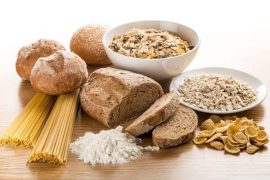Зміст
You don’t need much for stomach problems. Indigestion, pain, diarrhea, flatulence, and even vomiting can occur from stale or oily food. Stomach problems are usually not harmful to your health, but if they recur periodically, see your doctor, as they can be a symptom of serious medical conditions. However, when they are sporadic, it is worth helping yourself with home remedies.
Medicinal herbs that are considered effective are especially popular. To keep them safe, there are a few simple rules to follow to avoid serious complications. What herbs to use for stomach problems? What should I avoid during treatment?
Herbs with stomach problems: Mint

Among all the commonly available herbs, we intuitively choose mint for stomach problems. First, because its price is extremely affordable, and also because it is offered in most stores. Peppermint contains methyl essential oil as well as flavonoids, phenolic acids, and mineral salts. It also contains ascorbic acid, i.e. vitamin C, as well as rutin and betaine. Peppermint has a relaxing effect, especially on the smooth muscles of the digestive system. Moreover, it influences intestinal motility and facilitates digestion. Vitamin C helps to remove accumulated toxins in the body that cause indigestion. This substance also has a beneficial effect on the body’s natural immunity.
Herbs with stomach problems: Chamomile
Another herb that should be in your home medicine cabinet is chamomile. Its dried baskets can be used to prepare a fragrant infusion rich in phenolic acids, flavonoids and coumarins. Chamomile quickly relieves pain, reduces inflammation, but also has a beneficial effect on the nervous system, as it has a calming effect on the nerves. Chamomile is most often recommended for flatulence and diarrhea. It can also be used for indigestion and recurring stomach ulcers. Indispensable for intestinal colic and stomach cramps.
Herbs with stomach problems: St. John’s wort

St. John’s wort is a less popular herb used today to treat stomach problems. This does not mean that it is less effective than with mint or chamomile. St. John’s wort contains compounds similar to those found in the aforementioned herbs, i.e. flavonoids, tannins, or essential oil. The herb will help in the treatment of spasmodic pains in the stomach and biliary tract, but is especially helpful in all inflammatory conditions such as the stomach and intestines. Unfortunately, caution should be exercised when consuming St. John’s wort, as the active substances it contains can interact with medications. Therefore, it is best to consult with your doctor beforehand.
Herbs with stomach problems: Caraway
Cumin is a spice commonly used in cooking. Its aromatic taste will enrich traditional Polish dishes such as bigos, silage or homemade bread. It is worth knowing that it not only enhances the taste of dishes, but also has a beneficial effect on the digestive system. It contains an essential oil composed of substances such as carvone, limonene, and dihydrocarveol. Vitamins A and D also support the body’s immunity.
Caraway seeds and infusion prepared from it improve intestinal motility, as well as increase stomach acid secretion, which contributes to more efficient digestion. They can also help after a heavy meal by reducing the amount of gas that causes gas and bloating. Cumin should be consumed as often as possible by people with acid reflux and heartburn.
Herbs with stomach problems: Calendula
Calendula is a popular plant in our gardens. Its decorative qualities are invaluable, but there is a lot of talk about its involvement in skin care, as cosmetics containing its extracts improve its healthy appearance. Few people know that calendula also helps in treating stomach problems. It has antibacterial and anti-inflammatory properties, quickly neutralizes microorganisms that cause food poisoning. It can also be used for inflammation of the stomach lining, as well as for recurrent ulcers. Interestingly, its use helps to regenerate damaged cells and tissues that are affected by pathogens.
Using herbs
Modern herbal medicine is effective, and its immediate application gives a tangible effect. But when using herbs on your own, be reasonable and do not exceed the doses of infusions and dietary supplements (no more than three times a day). Chronically ill who are constantly taking medication should consult a doctor when using herbs in order not to cause unwanted effects. If there is no reason to exclude the use of herbs, it is also worth not combining them at the same time, since such mixtures can aggravate existing ailments or not work at all.








